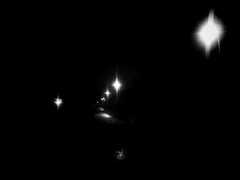 Note: This post contains a single strong obscenity used in quotation.
Note: This post contains a single strong obscenity used in quotation.I've made a decision: I'm not going to review the novel I just finished reading. In fact, I'm not even going to mention the book's name or author. Why, you ask? Because I hate leaving negative write-ups, especially when an author has compositional chops. It's easy to trash a title that drops punctuation and embraces cliché, but that wasn't this book's problem. Instead, I disliked it because it was a certain shade of noir.
Now, no one can accuse me of disliking noir as a whole. I've published in the genre multiple times, and I expect such tales to feature unpleasant people who come to unpleasant endings because of unpleasant things they've done. One doesn't read it looking for sunshine and kittens. But such a summary doesn't tell the entire story. Much like horror, one tends to see two distinct tints of noir. In the first hue, you see folks who look like they could've stepped from a classical tragedy. Some fatal flaw or unrepented transgression undoes everything they desire. Count Scott Smith's A Simple Plan and Lawrence Block's Grifter's Game as novels in this vein. Such tales recall Macbeth railing about sound and fury or ignorant Jephthah cinching the ropes tight around his daughter before whetting the knife. Even grimmer works lacking this clear moral vision, such as Benjamin Whitmer's Pike, often use bleakness to contrast life's beauty, providing a kind of chiaroscuro effect.
The second is less subtle. It seems informed by an obscene little aphorism some have attributed to crime writer James Ellroy: "We're all fucked." This tinge fairly drips with existential despair. You want a theme? See the quote. You long to understand the world's workings? See the quote. You yearn for a story to provide some sort of diversion from your problems? Too bad. See the quote.
I don't like that shade of noir.
Don't get me wrong, I know that existence isn't chocolate and roses. I read the headlines. I've travelled to Africa. I wonder how long the wicked will prosper and the unjust eat up the weak like grass. But I also know such sufferings aren't the whole story. Forget children's smiles and striking sunsets; how can an individual who makes his living in the joyous occupation of writing tactily deny the existence of hope, of life's essential goodness? Because that's what this novel did, and that's a conclusion I deny. Yet why call an author out publically? Why not offer a little grace instead? Because no matter life's woes or excellencies, we can never have too much of that.
(Picture: CC 2011 by carlstr)


3 comments:
I've read a few novels like the one you're talking about. You're right: better to let it go quietly into the noir night.
I read one recently that got such high critical acclaim, but I thought lacked any heart. Shame, really. Darkness feel pointless without that spark of hope, I think.
Glad to know someone else feels similarly!
Darkness feel pointless without that spark of hope, I think.
Or without -- for lack of a better term -- that clear moral vision of everything falling to pieces because of some violation or fault in the protagonist. I mean, Macbeth and Othello don't have a lot of hope, but that's because of their own actions. One never gets the feeling that they've been crushed by a mindless, pitiless universe.
(I'm conflating noir with tragedy, which may not be completely accurate. There does seem to be a rough correspondence, though.)
If Noir is tragedy, can one say that hardboiled draws from the book of Job--only without the happy ending?
If you leave Job as a pitiable mess who nevertheless insists "though you slay me, yet will I love you," you have something rather akin to Phillip Marlowe--a man insisting on virtue in a world that often seems to deny its existence.
Post a Comment